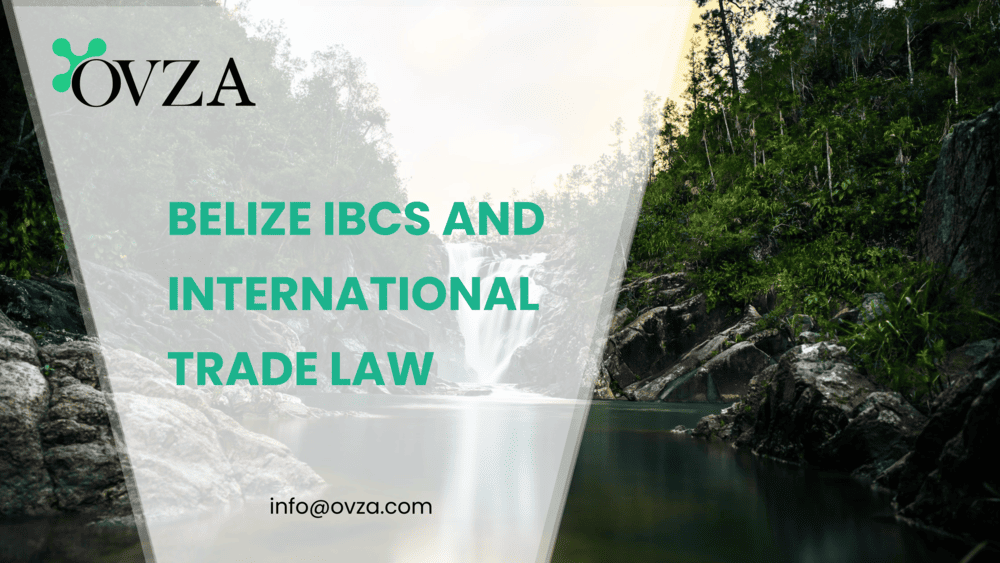Belize IBCs support global trade but must comply with WTO rules, OECD BEPS standards, and offshore regulations to remain effective and compliant. Belize International Business Companies (IBCs) are widely used in international finance and trade structuring due to their tax-neutral status, flexible ownership rules, and low regulatory overhead. As the global economy becomes more regulated and interconnected, however, the use of Belize IBCs in international trade raises important legal considerations. These entities, while highly advantageous for certain business models, must navigate complex frameworks established under international trade law, including customs regulations, tax treaties, and origin requirements.
1. Legal Status of Belize IBCs in Global Trade
Belize IBCs are governed by the International Business Companies Act, which enables foreign persons or entities to establish limited liability corporations that are exempt from local corporate taxation if they do not conduct business within Belize. Legally, a Belize IBC may import or export goods, act as a trading intermediary, and hold intellectual property. These activities are permissible under Belize law, and many international entrepreneurs structure their offshore trading entities through this jurisdiction for privacy, flexibility, and operational simplicity.
However, the ability to lawfully use a Belize IBC in global trade depends on more than just Belizean law. The importing and exporting jurisdictions involved in a transaction may impose their own requirements, including compliance with customs regulations, rules of origin, and reporting obligations. For instance, a Belize IBC acting as a contractual buyer or seller in an international sale may need to provide documentation on its ownership structure, transaction pricing, and value chain role to foreign tax or customs authorities. This is particularly important in the European Union, United States, and other developed markets with robust customs enforcement.
Belize IBCs are frequently used in conjunction with trading hubs in jurisdictions like Hong Kong, Singapore, and the Netherlands. These structures often route transactions through a Belize IBC to optimize tax efficiency or facilitate intercompany billing. While such strategies may be legally permissible, they must be carefully structured to comply with international legal standards. Improper use of Belize IBCs in trade can lead to recharacterization of transactions, denial of treaty benefits, or allegations of abusive tax practices.
2. Trade Compliance and Legal Risks for Belize IBCs
While Belize IBCs are legally permitted to participate in international trade, doing so brings with it significant compliance obligations under international law. Global authorities have increased their scrutiny of cross-border transactions that involve low- or zero-tax jurisdictions. When a Belize IBC is part of a global trade arrangement—especially in supply chains where it invoices goods or services—it may trigger investigations into customs valuation, transfer pricing, and substance requirements.
One area of frequent concern is whether a Belize IBC qualifies for preferential treatment under trade agreements. Belize is not a party to major free trade agreements like the EU’s Economic Partnership Agreements (EPAs) or the Comprehensive and Progressive Agreement for Trans-Pacific Partnership (CPTPP). Therefore, while a Belize IBC can legally trade with entities in these regions, it does not benefit from tariff reductions or rules-of-origin exceptions unless routed through another compliant jurisdiction. Misrepresenting the origin of goods or improperly routing them through Belize for tax advantages can result in customs penalties or forfeiture of the goods.
Another growing challenge stems from the OECD’s Base Erosion and Profit Shifting (BEPS) standards. These rules were designed to ensure that income is taxed where economic activity occurs. BEPS Action 5 specifically discourages harmful tax practices by requiring companies to demonstrate economic substance in their jurisdiction of incorporation. Although Belize introduced the Economic Substance Act in 2019 to comply with OECD demands, many IBCs are still required to file reports to prove legitimate business operations. Failing to meet these standards could result in sanctions or de-listing from international white lists. You can read more about BEPS from the OECD’s official portal.
The World Trade Organization (WTO) also governs trade law globally. While Belize is a WTO member, Belize IBCs themselves do not enjoy any special trade privileges simply by virtue of their incorporation. Instead, they are subject to WTO rules on transparency, nondiscrimination, and customs practices. Offshore entities that distort trade flows or serve primarily as shell conduits can attract regulatory attention under anti-avoidance frameworks. These include measures like the European Union’s DAC6 directive, which mandates disclosure of certain cross-border arrangements that could present a tax avoidance risk. For a detailed understanding of how international disclosure obligations affect offshore entities, OVZA’s article on how offshore companies lease assets to onshore businesses outlines the risks and legal structuring requirements involved in cross-border activity.
In practice, Belize IBCs that act as trading intermediaries often avoid holding inventory or taking delivery of goods, instead serving as contractual entities in digital transactions. While legally valid, these structures must be handled carefully. Failure to provide substance—such as a real office, employees, or demonstrable decision-making in Belize—can undermine their credibility under both trade and tax law.
3. Enforceability, Strategic Use, and Legal Structuring
To use a Belize IBC effectively in international trade, legal enforceability of contracts and compliance with foreign regulations are essential. While Belize’s legal system—based on English common law—provides a strong framework for commercial enforcement, the real test often lies in foreign jurisdictions where the IBC conducts business or holds accounts. Courts and regulators in the European Union, United States, and Asia may demand that a Belize IBC demonstrate real operational substance and transparent ownership to enforce contracts, open bank accounts, or benefit from commercial protections.
Banking and payment processing are often challenging for Belize IBCs engaged in trade. Many international banks and fintech providers impose de-risking policies or enhanced due diligence on clients from offshore jurisdictions. These policies are not driven by Belize law itself, but rather by the global compliance environment shaped by FATF, OECD, and G20 rules. To mitigate these challenges, IBC owners must be proactive about disclosure, reporting, and working with service providers who understand the legal intricacies of cross-border operations.
Belize has taken steps to align itself with international standards. The International Business Companies (Amendment) Act, 2018 and subsequent reforms introduced public registers of directors, updated AML/CFT provisions, and clarified reporting obligations. These legal changes are intended to make Belize IBCs more credible in the eyes of international authorities. However, owners and advisors must still be cautious. Structures that are technically legal but lack commercial justification—such as circular invoicing or interposed entities with no function—are increasingly viewed as abusive under international law.
Using a Belize IBC in international trade is most effective when paired with proper legal strategy. This includes selecting the right counterparty jurisdictions, understanding local trade and tax laws, and ensuring transparency in corporate governance. It may also involve using a multi-jurisdictional approach—incorporating a trading company in Belize, supported by operational entities in treaty-signing jurisdictions for invoicing or logistics. Such planning should always be guided by professionals familiar with international tax treaties and WTO principles.
Conclusion
Belize IBCs continue to serve as valuable instruments in international trade, offering cost efficiency, confidentiality, and legal flexibility. Yet the evolving regulatory landscape means these entities are now scrutinized not only by Belizean authorities but by customs officials, tax agencies, and compliance officers around the world. Legal success with a Belize IBC in global commerce requires more than formation—it requires thoughtful legal structuring, compliance with international trade law, and an understanding of the geopolitical environment in which the company operates.
With careful planning and sound legal advice, Belize IBCs can remain effective vehicles for international trade. They offer unique advantages for entrepreneurs, import-export specialists, and global service providers—so long as those advantages are pursued within the limits of evolving global law.
Disclaimer: The information provided on this website is intended for general reference and educational purposes only. While OVZA makes every effort to ensure accuracy and timeliness, the content should not be considered legal, financial, or tax advice.












